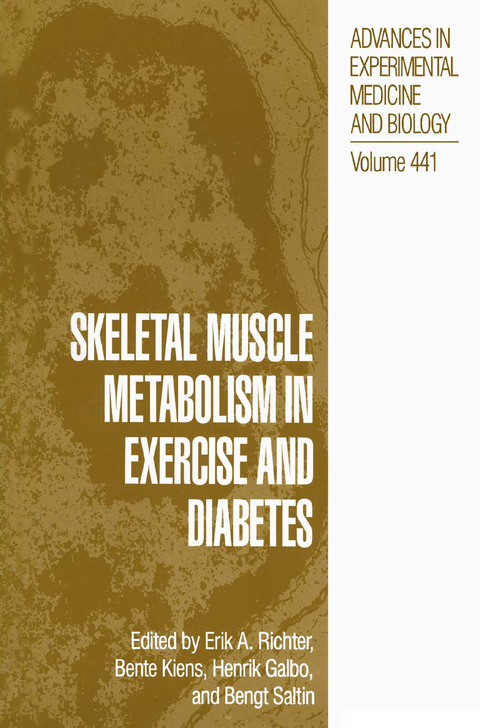
Skeletal Muscle Metabolism in Exercise and Diabetes
Springer-Verlag New York Inc.
978-1-4899-1930-4 (ISBN)
The Copenhagen Muscle Research Centre was founded in 1994 with the support of a grant from the Danish National Research Foundation. Among the goals for the Centre is the organization of research symposia, with the aim of bringing a limited number ofintemation ally renowned scientists together to discuss the latest developments and perspectives in their field. The first Copenhagen Muscle Research Centre Conference was held in 1995 and dealt with cardiovascular regulation. The Second Copenhagen Muscle Research Centre Confer ence was held from October 23-26, 1997. The topic of the Symposium was Muscle Metabo lism: Regulation, Exercise, and Diabetes. Seventy invited scientists from all over the world discussed their latest research related to skeletal muscle metabolism. The speakers were asked to expand on their presentations and to write short, but comprehensive, chapters about their given topics. The result is 28 peer-reviewed and edited chapters covering many if not all aspects of muscle energy metabolism related to exercise and diabetes. Emphasis is on regulation of glucose and fatty acid metabolism and the mechanisms regulating their use as fuels for the muscle during exercise. In addition, abnormalities in the regulation of glucose metabolism in the diabetic state are described. However, amino acid and protein metabolism are also thoroughly discussed. We believe that this volume brings an unparralleled, up to date, and comprehensive review of the frontiers in muscle metabolism. Erik A.
1. An Overview of Muscle Glucose Uptake during Exercise: Sites of Regulation.- 2. Anatomy of Glucose Transporters in Skeletal Muscle: Effects of Insulin and Contractions.- 3. Role of Transverse Tubules (T-Tubules) in Muscle Glucose Transport.- 4. GLUT5 Expression and Fructose Transport in Human Skeletal Muscle.- 5. SNAREing GLUT4 at the Plasma Membrane in Muscle and Fat.- 6. Molecular Mechanisms Involved in GLUT4 Translocation in Muscle during Insulin and Contraction Stimulation.- 7. Insulin Signaling and Glucose Transport in Insulin Resistant Skeletal Muscle: Special Reference to GLUT4 Transgenic and GLUT4 Knockout Mice.- 8. Role of Nitric Oxide in Contraction Induced Glucose Transport.- 9. Role of Adenosine in Regulation of Carbohydrate Metabolism in Contracting Muscle.- 10. Training Effects on Muscle Glucose Transport during Exercise.- 11. Hepatic Glucose Production during Exercise.- 12. Insulin Sensitivity, Muscle Fibre Types, and Membrane Lipids.- 13. Training Induced Changes in the Fatty Acid Composition of Skeletal Muscle Lipids: Functional Aspects.- 14. Fat Metabolism in Exercise.- 15. Mechanisms Regulating Adipocyte Lipolysis.- 16. Regulation of Fatty Acid Delivery in Vivo.- 17. Transport of Long-Chain Fatty Acids across the Muscular Endothelium.- 18. Skeletal Muscle Fatty Acid Transport and Transporters.- 19. Intracellular Transport of Fatty Acids in Muscle: Role of Cytoplasmic Fatty Acid-Binding Protein.- 20. Hormone-Sensitive Lipase (HSL) Expression and Regulation in Skeletal Muscle.- 21. Training and Fatty Acid Metabolism.- 22. Intramuscular Mechanisms Regulating Fatty Acid Oxidation during Exercise.- 23. Regulation of Fat/Carbohydrate Interaction in Human Skeletal Muscle during Exercise.- 24. Malonyl CoA as a Metabolic Switch and a Regulator of Insulin Sensitivity.- 25. Anaplerosis of the Tricarboxylic Acid Cycle in Human Skeletal Muscle during Exercise: Magnitude, Sources, and Potential Physiological Significance.- 26. Pyruvate Dehydrogenase Complex Activation Status and Acetyl Group Availability as a Site of Interchange between Anaerobic and Oxidative Metabolism during Intense Exercise.- 27. Amino Acid Transport during Muscle Contraction and Its Relevance to Exercise.- 28. Protein and Amino Acid Metabolism in Human Muscle.
| Reihe/Serie | Advances in Experimental Medicine and Biology ; 441 |
|---|---|
| Zusatzinfo | XII, 330 p. |
| Verlagsort | New York |
| Sprache | englisch |
| Maße | 155 x 235 mm |
| Themenwelt | Naturwissenschaften ► Biologie ► Biochemie |
| ISBN-10 | 1-4899-1930-9 / 1489919309 |
| ISBN-13 | 978-1-4899-1930-4 / 9781489919304 |
| Zustand | Neuware |
| Haben Sie eine Frage zum Produkt? |
aus dem Bereich


